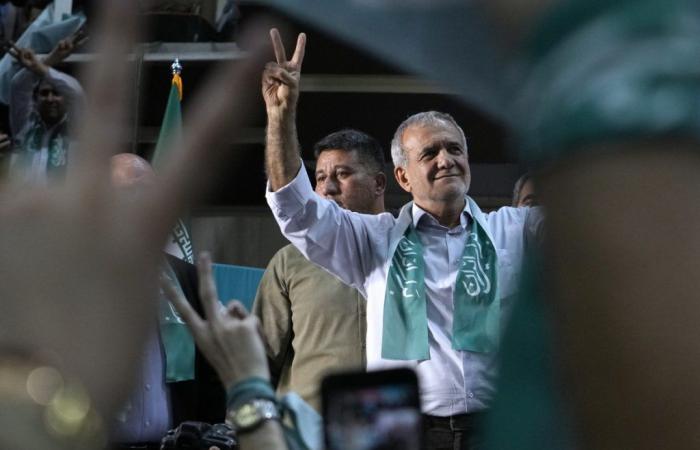As widely expected, none of the candidates managed to surpass the 50% threshold in the first round of Iran’s presidential elections. Everything was postponed to the second round. The reformist candidate, Masoud Pezeshkian, obtained 42% of the votes, followed by Saeed Jalili, an ultra-conservative candidate, with 38% of the votes, while the speaker of the parliament, Bagher Ghalibaf, ended his run with a disappointing 13 %. The most relevant data is that only 40% of voters participated in the elections in the Islamic Republic, thus marking a negative turnout record.
THE AYATOLLAH Khamenei, the country’s leader, cast his vote in Tehran on the morning the polls opened, directly addressing reports of poor turnout. “Some are undecided,” he said. «There is no justification for indecision. The continuity of the Islamic Republic depends on the turnout and participation of the people.”
For the ruling clerics, who see voter participation as a crucial indicator of their legitimacy, the low turnout represents a serious blow. The situation is further complicated by the fact that more than 4% of the votes were declared invalid. Moreover, according to many observers inside the country, some of those who participated did so out of fear, work constraints or subsistence.
Even the reformist candidate failed to overcome popular distrust, which was his main challenge. Distrust and popular apathy led many people to desert the polls, people who would otherwise most likely have voted for a reformist. Pezeshkian’s assiduous adherence to the political line of the system had a negative impact. The population perceived that Pezeshkian had neither the ability nor the will to challenge the repressive laws, and his promises to improve the economic situation were not convincing.
The credibility of the entire Reformist Front, gained during the rule of the moderate President Khatami, also seems to have faded over time. The conformity of the reformists to the mainstream policy without significant resistance and the lack of a firm stance against the harsh repression of the “Woman, Life, Freedom” movement have contributed to this deterioration.
THE DECLINE IN TURNOUT it is an alarm signal that reveals the widespread discontent and mistrust that pervade many social classes, highlighting a growing disenchantment among young people and women excluded from political and social life. The discontent is not limited to the opponents and the disillusioned who desert the polls. Despite the decrease in turnout, the fact that Pezeskhian obtained the majority of votes suggests that even a part of the traditionally pro-system population found the reform candidate more reliable than the leaders of the conservative faction.
The bitter struggle in the election campaign between two conservatives testifies to the internal conflict between the two souls of the traditionalists. Although many clergy leaders had supported Ghalibaf, Said Jalili emerged.
Jalili, a former chief nuclear negotiator and secretary of the Supreme Security Council, is seen as more ideologically rigid than Ghalibaf, emphasizing the country’s self-sufficiency and resistance to Western influence. His close alignment with ultra-conservative religious leaders and factions makes him similar to the controversial, unpopular ultra-conservative former president Ahmadinejad.
A FEW HOURS after the results came out, Ghalibaf asked his supporters to support Jalili. This might make it seem that with the support of Ghalibaf and his supporters the path to victory in the second round is clear for the ultra-conservative candidate.
However, domestic observers point out that, given the long history of conflict and the ideological divide evident even in the current parliament, Ghalibaf’s support may only be superficial. The speaker of parliament knows well that, with a parliament dominated by ultra-conservatives, Jalili’s victory would put his political career at risk.
Moreover, although the reformist candidate failed to attract a larger number of voters, he managed to run a good campaign in just two weeks, without a previously prepared structure. Now he has a second chance to convince the population and save the country from the fundamentalist thinking that Jalili represents. The slogan is already ready: “Perhaps a reformist president cannot do much, but a fundamentalist in power can do a lot of harm to the country.”






